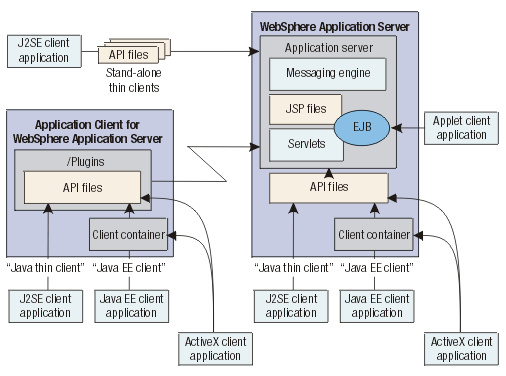Types of client applications
You can write client applications that run separately from your application server. A client application uses the framework provided by an underlying client to access the resources provided by WebSphere® Application Server.
Several types of clients are installed either with WebSphere Application Server or, optionally, with the Application Client for WebSphere Application Server.

The following table provides a comparison of the different types of clients that are available.
| Stand-alone thin clients | Resource Adapter for JMS | Java EE client (Java EE mode of Application Client) | Java thin client (Java SE mode of Application Client) | Java EE client (Java EE mode of Application Server1 | Java thin client (Java SE mode of Application Server) 1 | Pluggable Application Client (deprecated) | |
|---|---|---|---|---|---|---|---|
| Unique characteristics | Embeddable single jar with small footprint | JCA v1.5 resource adapter with small footprint | Large client footprint with many files | Large client footprint with many files | Very large server footprint with many files | Very large server footprint with many files | Large client footprint with many files (subset of Application Client for WebSphere Application Server |
| Supported execution environment | Java SE | Java EE v1.4 application server: Apache Geronimo, WebSphere Application Server Community Edition, JBoss | Java EE client container | Java SE | Java EE client container | Java SE | Java SE |
| Supported Java vendors | IBM, Sun, and HP-UX | As per J2EE vendor | Supplied IBM application server | Supplied IBM application server | Supplied IBM application server | Supplied IBM application server | Sun |
| Supported Java version | See Table 2 | Supplied IBM JRE | Supplied IBM JRE | Supplied IBM JRE | Supplied IBM JRE | 1.5+ | |
| Supported transactions | No transactions and local transactions | No transactions, local transactions, and XA transactions for JMS | No transactions, and local transactions for JMS | No transactions, and local transactions for JMS | No transactions, local transactions for JMS | No transactions, and local transactions for JMS | No transactions, and local transactions for JMS |
| Easily embedded | Yes | No | No | No | No | No | No |
| Include JNDI lookup capability to WebSphere Application Server | Available through the Thin Client for Enterprise JavaBeans (EJB) | Not applicable (relies on host application server JNDI) | Yes | Yes | Yes | Yes | Yes |
| Connectivity support | TCP and SSL | TCP and SSL | TCP, HTTP, and SSL | TCP, HTTP, and SSL | TCP, HTTP, and SSL | TCP, HTTP, and SSL | TCP and HTTP |
| Notable restrictions | Thin Client for JMS does not support HTTP connectivity. For web services, the use of SOAP/JMS is not supported by the thin client environment. The Administration Thin Client does not support co-existence with other thin clients. |
No HTTP connectivity | None | None | None | None | No SSL support |
| License type | IPLA (unlimited copy but no redistribution), and ILAN (redistribution) | IPLA (unlimited copy but no redistribution), and ILAN (redistribution) | IPLA (unlimited copy but no redistribution), and ILAN (redistribution) | IPLA (unlimited copy but no redistribution), and ILAN (redistribution) | IPLA | IPLA | IPLA (unlimited copy but no redistribution), and ILAN (redistribution) |
1 The information in this column relates to WebSphere Application Server when used as the client runtime environment.
The following table provides additional information on the supported JRE versions for stand-alone thin clients.
| Type | JRE Versions |
|---|---|
| Enterprise JavaBeans thin client | |
| Java Message Service thin client | |
| Java API for XML-based RPC (JAX-RPC) thin client | |
| Java API for XML-Based Web Services (JAX-WS) thin client | |
| Administrative thin client | |
| Java Persistence API (JPA) |
![[AIX Solaris HP-UX Linux Windows]](../images/ngdist.svg)
![[z/OS]](../images/ngzos.svg) Java EE client
Java EE client